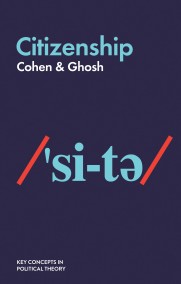
Cyril Ghosh is Vice President of NYSPSA and an Assistant Professor at Wagner College where he teaches courses in American government, political theory, and immigration. His research specializations include identity politics/multiculturalism, gender & sexuality, and citizenship & immigration.
Although we live in a period of unprecedented globalization and mass migration, many contemporary western liberal democracies are asserting their sovereignty over who gets to become members of their polities with renewed ferocity. Citizenship matters more than ever.
In this book, Elizabeth F. Cohen and Cyril Ghosh provide a concise and comprehensive introduction to the concept of citizenship and evaluate the idea’s continuing relevance in the 21st century. They examine multiple facets of the concept, including the classic and contemporary theories that inform the practice of citizenship, the historical development of citizenship as a practice, and citizenship as an instrument of administrative rationality as well as lived experience. They show how access to a range of rights and privileges that accrue from citizenship in countries of the global north is creating a global citizenship-based caste sys
This skillful critical appraisal of citizenship in the context of phenomena such as the global refugee crisis, South-North migration, and growing demands for minority rights will be essential reading for students and scholars of citizenship, migration studies and democratic theory.
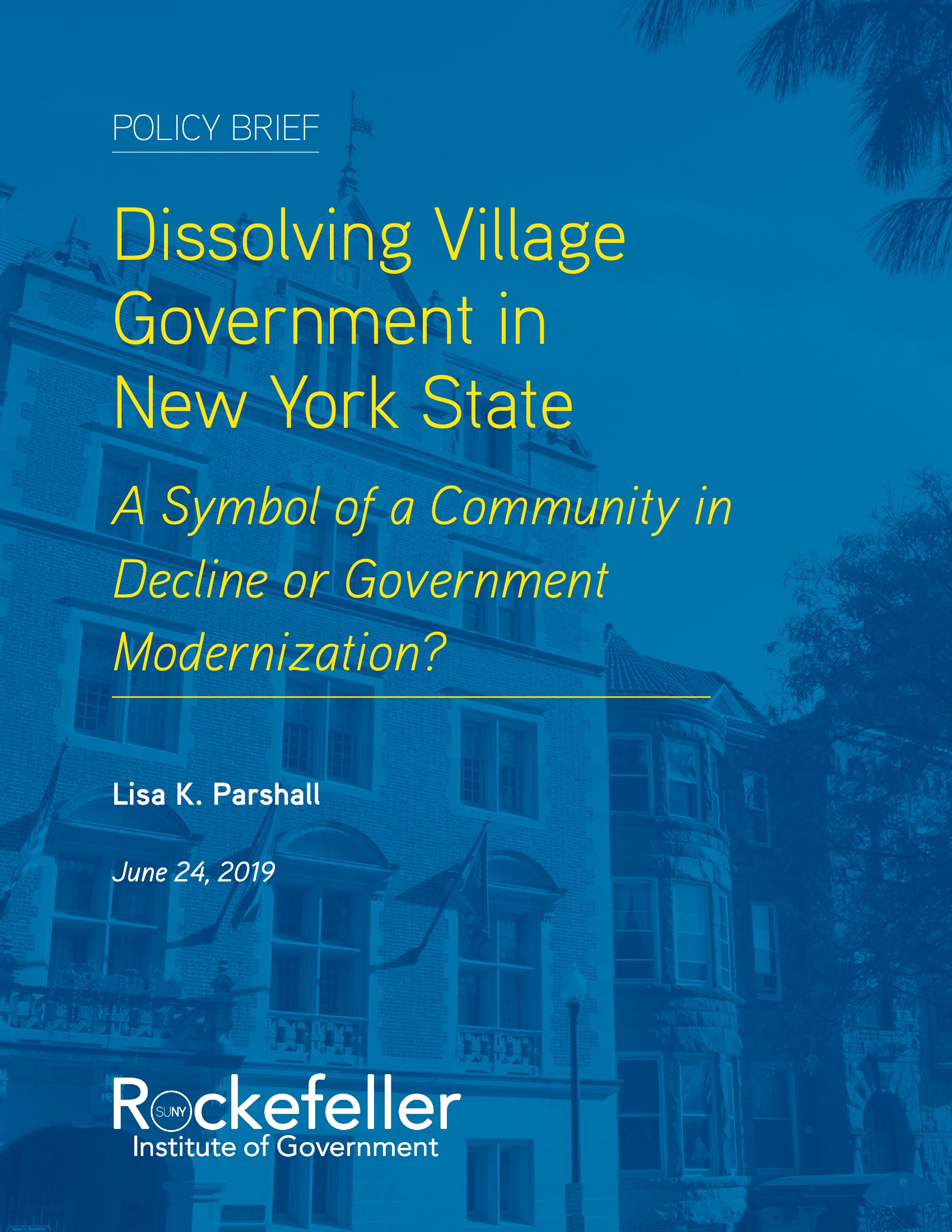
Lisa K. Parshall is an Associate Professor of Political Science at Daemen College in Amherst, New York, specializing in American Politics, Public Law, and Public Policy. She has served as an officer for the New York State and Northeastern Political Science Associations, as an Advisor for Vote Smart, and is a Richard P. Nathan Public Policy Fellow at the Rockefeller Institute of Government in Albany, New York.
Residents in a growing number of New York villages are contemplating the question of whether to retain their village’s incorporated status or to dissolve into the surrounding town (or towns). This policy brief briefly examines the impetus behind New York State’s push to dissolve village governments and the passage of the New N.Y. Government Reorganization and Citizen Empowerment Act in 2010. An evaluation of the data reveals that there has been an uptick in the number of villages voting on dissolution, and the success rate (as measured by percentage of referendum approved) is lower under the new provisions. From a state-level perspective, the dissolution and consolidation of village and town governments makes fiscal sense. By examining local responses to the dissolution debate and by visiting villages that have debated the dissolution question, I identify some of the noneconomic reasons why village residents are often reluctant to dissolve and the significant role that community symbols and functions play in the narrative framing of the dissolution debate. For evidence-based policymakers, a better understanding of community perceptions is an important part of the puzzle, helping to explain why residents more frequently reject dissolution as symbolic of community decline than embrace it as a pathway to modernization and lower taxes.

Cyril Ghosh is an Assistant Professor at Wagner College where he teaches courses in American government, political theory, and immigration. His research specializations include identity politics/multiculturalism, gender & sexuality, and citizenship & immigration.
This book critically interrogates three sets of distortions that emanate from the messianic core of 21st century public discourse on LGBT+ rights in the United States. The first relates to the critique of pinkwashing, often advanced by scholars who claim to be committed to an emancipatory politics. The second concerns a recent US Supreme Court decision, Obergefell v. Hodges (2015), a judgment that established marriage equality across the 50 states. The third distortion occurs in Kenji Yoshino’s theorization of the concept of gay covering. Each distortion produces its own injunction to assimilate, sometimes into the dominant mainstream and, at other times, into the fold of what is axiomatically taken to be the category of the radical. Using a queer theoretic analysis, De-Moralizing Gay Rights argues for the dismantling of each of these three sets of assimilationist injunctions.
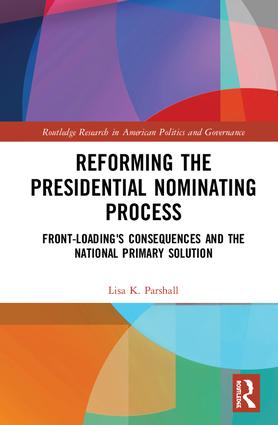
Lisa K. Parshall is an Associate Professor of Political Science at Daemen College in Amherst, New York, specializing in American Politics, Public Law, and Public Policy. She has served as an officer for the New York State and Northeastern Political Science Associations, as an Advisor for Vote Smart, and is a Richard P. Nathan Public Policy Fellow at the Rockefeller Institute of Government in Albany, New York.
Reforming the Presidential Nominating Process: Front-Loading's Consequences and the National Primary Solution critiques the contemporary nominating process from the perspective of voters and their right to effectively participate in their parties’ selection of a presidential nominee. Employing both a common-sense and legal, rights-based framework to invite a constitutionally grounded conversation on the legitimacy of the current presidential nominating process, Lisa K. Parshall argues that timing of participation in the nomination goes hand-in-hand with the right to choose a candidate and the fairest way to restore the promise of meaningful and timely participation for all voters is by adopting a same-day national primary.
Viewed from the party membership perspective, this work illuminates the fundamental interests at stake that should be considered in any potential reform of the presidential nominating system.
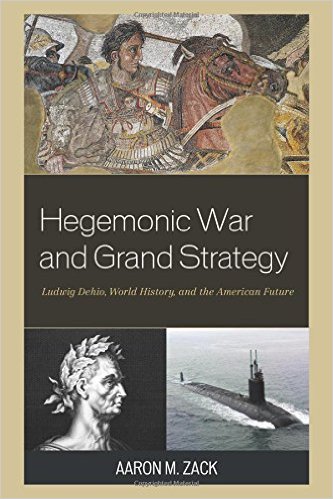
Aaron Zack teaches political science at Baruch College and John Jay College of the City University of New York. His research interests include global conflict, American foreign policy, terrorism, diplomatic history and intellectual history. He received his PhD in 2010 in International Relations and European Studies from the Johns Hopkins University, School of Advanced International Studies.
Ludwig Dehio (1888–1963) advanced a theory of the historical dynamic of the modern European state system (1494–1945) and its hegemonic wars. After explaining Dehio’s thoughts about why none of the European Powers were successful in their attempts to conquer the Continent, the study analyzes bids for hegemony in the historical Hellenic, Hellenistic, Roman, Renaissance Italian, modern European, and western hemispheric state systems. The purpose of these analyses is to demonstrate how Dehio’s thought illuminates the dynamics of hegemonic conflicts. Additionally, this book examines how prior hegemonic struggles illuminate some of the dilemmas of contemporary American grand strategy. It then considers how Dehio’s thoughts on hegemony enrich our understanding of contemporary challenges, such as the struggles for power in the Middle East and East Asia, the rise of China and its Western Hemispheric ambitions, and American grand strategic options. The study concludes by arguing that Dehio’s thought suggests that particular grand strategies will partially determine the global system’s movement towards destructive bids for hegemony, or a viable plural order.
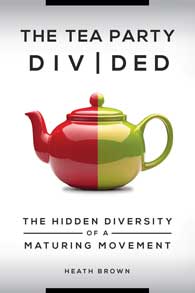
Heath Brown is an assistant professor of public policy at the John Jay College of Criminal Justice, City University of New York. He has worked at the US Congressional Budget Office as a Research Fellow, at the American Bus Association as a Policy Assistant, and at the Council of Graduate Schools as Research Director.
Unlike previous books on the Tea Party, Tea Party Divided looks at the second phase of party growth to show that what was once considered a monolithic movement is truly a collection of different opinions.
Since the Tea Party exploded onto the American political scene, it has matured and changed, but the differences that now exist within the movement are largely unacknowledged. A more nuanced understanding is called for. Previous treatises have sought explanations for the rise of the movement and focused primarily on its early days. This book, in contrast, focuses on understanding the diversity within the party, challenging the notion that the Tea Party is a homogeneous political movement defined mainly by its ultra-conservatism, regionalism, and rigid political orthodoxy.
To accurately depict the Tea Party as it exists today, the book explores how the party evolved from its first phase to its second, examining important distinctions in terms of who has joined and who has served in Congress and other offices. Differences in Tea Party organizations around the country are examined and their funding sources considered. The book also explores the political positions taken by Tea Party members, looking at the voting records of party legislators to see if they've adhered to stated movement objectives. Finally, and perhaps most intriguingly, the author speculates on what this all means and suggests possible futures for the diverse Tea Party strands.

Sam B. Edwards III J.D., L.L.M. is a Professor of Environmental Law and Policy at Green Mountain College in Vermont. He has studied, practiced, and taught law in the US, Kenya, Micronesia, and Japan.
The book evaluates the relationship between governments and their constituents, and how this relationship is impacted by emerging technologies. Discussing both developed and underdeveloped nations, this book provides a comparison for the ongoing shift in societies, serving as a critical reference for legal professionals, activists, government employees, academics, and students.

Dr. Robin Lauermann is Professor of Politics and Assistant Dean of General Education and Common Learning at Messiah College in Pennsylvania. Her research focuses on political behavior and empowerment.
The book examines the nature of representation in democracy, focusing on constituent evaluations of Congress members and the implications these results have on citizens' influence on government.
This analysis elaborates on the complex relationship citizens have with their representatives, shedding light on the constituent perspective in two ways. Constituent Perceptions of Political Representation shows that symbolic responsiveness is often the most influential factor affecting constituent evaluations while also posing significant questions about the basis of our democracy: if we are dissatisfied with the caliber of our government, do we acknowledge our role as citizens in setting poor or vague standards? Why are we dismayed when representatives give us what we ask for?
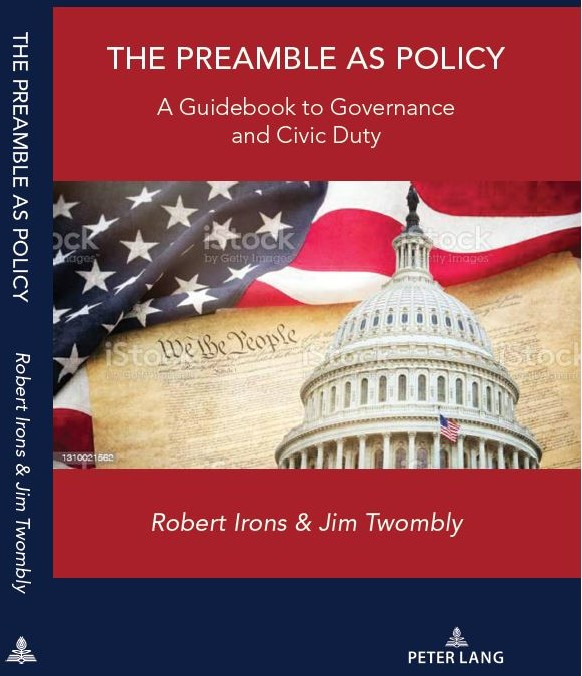
Robert Irons (Author) Jim Twombly (Author)
Robert Irons (Ph.D., Illinois Institute of Technology) is Associate Professor of Finance and Chair of the Accounting and Finance Department at Illinois Wesleyan University. He has taught undergraduate and MBA students for over twenty years and is published in numerous academic journals, including the Journal of Portfolio Management. Dr. Irons worked as a financial analyst for AT&T and United Airlines. Jim Twombly (Ph.D., Stony Brook University) is Professor of Political Science at Elmira College in New York and Vice President of the New York State Political Science Association. He is the author of The Progression of the American Presidency, Political Scandal and American Pop Culture: Sex, Power, and Cover-ups, and Directing the Whirlwind: The Trump Presidency and the Deconstruction of the Administrative State (with Lisa K. Parshall).
In The Preamble as Policy: A Guidebook to Governance and Civic Duty the authors show that the Preamble to the Constitution is more than an introduction to the document; it sets the tone for the rest of the document and how it should be viewed and interpreted. It is also a list of goals for a new government and a tool for holding our elected representatives accountable for their efforts on our behalf. The Preamble as Policy looks at the history of the development of the Constitution to show how the Preamble can be used to judge the laws and policies enacted by the federal government. The Preamble as Policy weaves political thought, history, and current events together allowing for examination of an oft forgotten part of the Constitution. It provides a unique framework and firm foundation for class discussions or social interactions about what we have achieved as a nation and where we might have come up short.
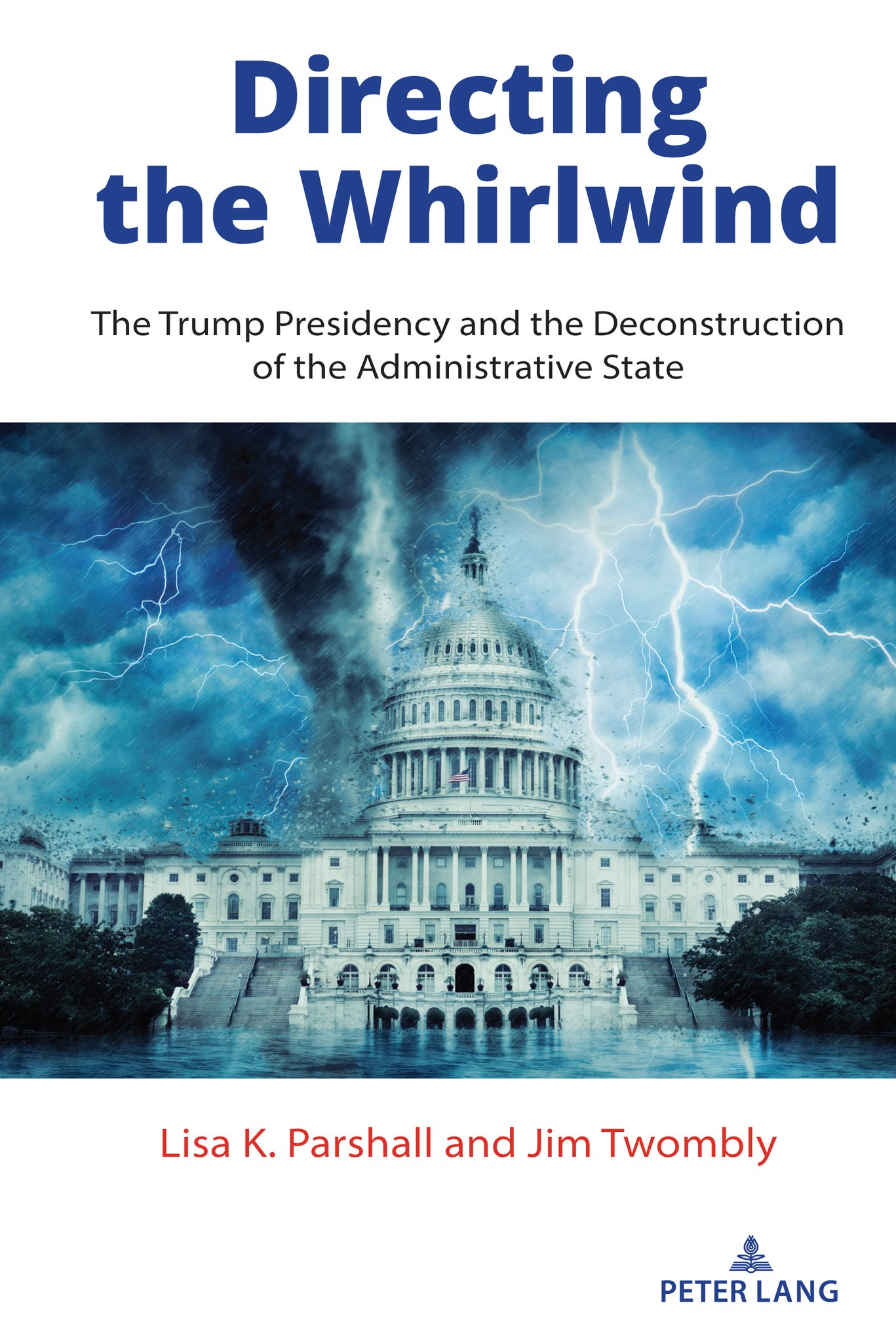
Lisa K. Parshall (Author) Jim Twombly (Author)
Lisa K. Parshall is Professor of Political Science at Daemen College in Amherst, New York. She earned her Ph.D. at the SUNY-Buffalo in 2001 and is the author of Reforming the Presidential Nominating Process: Front-Loading’s Consequences and the National Primary Solution. Jim Twombly is Professor of Political Science at Elmira College in Elmira, New York and Vice President of the New York State Political Science Association. Earning his Ph.D. at Stony Brook University in 1992, he is the author of The Progression of the American Presidency and Political Scandal and Political Scandal and American Pop Culture: Sex, Power, and Cover-ups.
Donald J. Trump ran on a platform that, among other things, promised to "drain the swamp" that is Washington, DC. Part of that draining would entail what his chief strategist, Steve Bannon, would call "the deconstruction of the administrative state." Set in the political environment of 2020, with a raging pandemic and nationwide protests, this work examines the philosophy that guides the Trump Administration’s approach and the mechanisms by which it seeks to accomplish the deconstruction. By combining journalistic accounts with presidential and public administration scholarship, the book raises questions about the impact of Trump’s approach on the future of public administration. As such, this work makes a strong contribution to public administration and presidential studies and casts a scholarly light on treatments of Trump’s contribution to governance and politics.